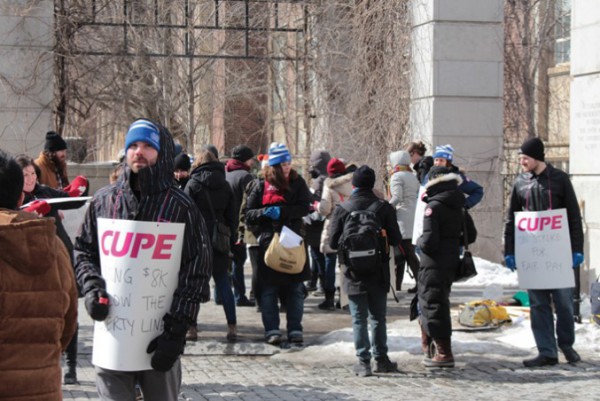Teaching assistants and contract faculty are on strike at the University of Toronto and York University while the Ryerson union is set to vote on a tentative agreement next week
Behdad Mahichi
The Eyeopener (Ryerson University)
(CUP)—Teaching assistants at the University of Toronto and York University are on strike after rejecting tentative deals from their separate schools, while Ryerson awaits a vote that will decide its future.
At York University, the Canadian Union of Public Employees (CUPE) local 3903, which represents teaching assistants and contracted professors, voted on March 2 to reject a deal presented by the university. Students and their grades are held in limbo after the university senate declared all classes and exams cancelled until the strike is over, with a “minimal number” of exceptions.
At the University of Toronto, a bargained deal was reached between the school and CUPE 3902, until it was taken to membership on Feb. 27, who then voted an overwhelming 90 per cent against the proposed contract.
At Ryerson, teaching assistants who are represented by CUPE 3904 Unit 3 reached a tentative agreement on Feb. 26 at 11:30 p.m. But the membership still needs to hold a ratification vote to complete the deal.
“There are specific things that we were negatively affected by personally, due to ambiguity in the previous contract,” said Aneesa Khan, chief steward of Unit 3 at Ryerson. “Some committee members were able to successfully get the things that they wanted. Others, not so much.”
Joseph Zboralski, president of CUPE 3904, said that TAs of the union will vote on the deal some time next week, and if they vote to reject the contract, Zboralski said they will have two options: to ”mandate the bargaining committee to go back to management,” or to go on strike.
It is unclear at the moment what decisions will be made at the vote, and whether or not a strike will follow. In the meantime, CUPE 3904 has shown support for TAs at U of T by joining in on a rally held on Feb. 26.
“Our membership was there to support them,” Khan said. “We went out and have been in the cold with them.”
The 6,000 union members at U of T set up picket lines around St. George, Mississauga and Scarborough campuses on March 2, with many saying the deal failed to address the key concerns of the strike.
“The members, after rigorous debate, decided that the offer that was on the table was not enough in terms of them getting closer to the poverty line,” said Abe Nasirzadeh, the lead organizer of the strike.
The strike came unexpected to many students at U of T. Second-year computer science student Kevin Kim said the strike caused him a lot of confusion.
“They sent everyone a mass email. At that point I thought we avoided disaster,” he said. “But then 12 hours later they sent another email and they just said ’strike is happening.’”
The strike affected all of Kim’s classes.
“I have a midterm tomorrow, and it’s still going on. But now the professor has to re-write every single question so that it’s easier to mark,” he said.
Some Ryerson students who are part of the Ryerson-York Exchange have also been affected by the strike, after having their classes at York cancelled.
TAs are usually graduate students who work either full-time or part-time. Their salary in Ontario averaged at $15,000 a year, the CBC reported. According to Statistics Canada, the cut-off for a low-income individual working in a big city is set at $23,000.
Faculty and support staff at Ontario’s 24 public colleges are currently in the first year of a three-year contract.
With files from Mick Sweetman


